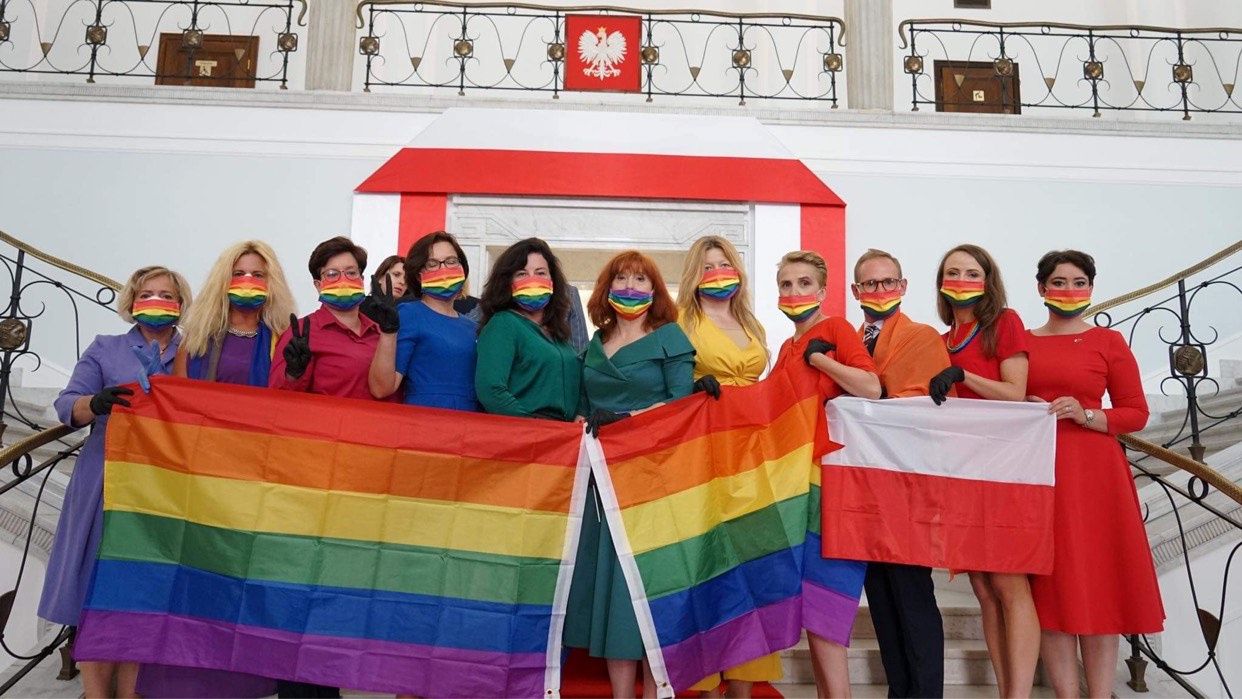News
August 06, 2020
A Polish rainbow: When Poland's ultra-conservative president Andrzej Duda was sworn in for his second term on Thursday, he was greeted by a show of colors, as members of the opposition coordinated their outfits to reflect the rainbow flag that symbolizes solidarity with the gay community. Duda, an ally of the nationalist ruling Law and Justice (PiS) party, who beat Warsaw Mayor Rafał Trzaskowski by a hair, made gay rights a major political issue in the campaign, repeatedly denouncing "LGBT ideology," as a threat to the nation. Meanwhile, several rural Polish towns that support PiS have declared themselves "LGBT free," prompting infuriated officials in Brussels to threaten to withhold EU funding. Indeed, this episode is just the latest flashpoint in the worst culture war in Poland since the end of the Cold War.
Macron's pledge to Lebanon: When French President Emmanuel Macron visited Beirut's shattered downtown on Thursday, he was swarmed by disillusioned Lebanese who had a clear message: "the people demand the fall of the regime." Visiting the former French colony, Macron met with Lebanese political forces from different factions, whose corruption, negligence, and mismanagement are to blame for Tuesday's explosions as well as the country's spiraling economic crisis. Speaking to Lebanese who swarmed the French delegation downtown — many of whom begged the French president to "please help us" — Macron pledged to create "a new political pact in Lebanon," and said he would return to the crisis-ridden country in September to follow up on its progress. Macron also vowed that the current flow of international aid will not be used to line corrupt politicians' pockets but will be directed towards rebuilding the battered capital. Will Macron succeed where successive internal and external efforts have repeatedly failed?
Brazil must protect Amazon tribes from pandemic: Whether he likes it or not — and evidently he does not — Brazilian President Jair Bolsonaro must take measures to protect his country's sizable indigenous population from the ravages of the coronavirus. The Supreme Court said as much in a ruling handed down on Wednesday, just hours after a well-known indigenous leader died of the disease. Last month, Bolsonaro — who has questioned the pandemic's severity and wants to see more development of the Amazon rainforest where many indigenous communities live— vetoed parts of a bill containing measures to protect those groups from the spread of COVID-19, citing budgetary concerns. The Supreme Court ruling is likely to inflame ongoing tensions between Bolsonaro (and his followers) and the courts.
More For You
Ian Bremmer sits down with former US Ambassador to NATO Ivo Daalder to unpack a historic shift in the transatlantic alliance: Europe is preparing to defend itself without its American safety net.
Most Popular
Think you know what's going on around the world? Here's your chance to prove it.
U.S President Donald Trump, U.S. Vice President JD Vance, and U.S. Secretary of State Marco Rubio pose for a family photo with other representatives participating in the inaugural Board of Peace meeting, at the U.S. Institute of Peace in Washington, D.C., U.S., February 19, 2026.
REUTERS/Kevin Lamarque
Argentina, Armenia, Belarus, Egypt, Indonesia, Jordan, Pakistan, Paraguay, Vietnam – to name only a few.
A poster featuring Andrew Mountbatten-Windsor, formerly known as Prince Andrew, is installed on a sign leading to the parking area of the Sandringham Estate in Wolferton, as pressure builds on him to give evidence after the U.S. Justice Department released more records tied to the late financier and convicted sex offender Jeffrey Epstein, in Norfolk, Britain, February 5, 2026.
REUTERS/Isabel Infantes
British police arrested former Prince Andrew Mountbatten-Windsor today over allegations that in 2010, when he was a UK trade envoy, he shared confidential government documents with convicted sex offender Jeffrey Epstein.
© 2025 GZERO Media. All Rights Reserved | A Eurasia Group media company.
